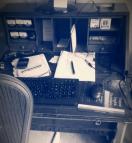 I have automated back-ups that keep a copy of my work every day. I have a system in place for if my computer fails. I thought I had it all covered, and I almost did – but this is what I learned when my hard drive suddenly crashed in somewhat epic fashion one week last month, followed by another, more catastrophic crash of the cobbled-together system I was working on while plucking up the courage to move to my new computer. I thought it might help other people – do share your tips in the comments!
I have automated back-ups that keep a copy of my work every day. I have a system in place for if my computer fails. I thought I had it all covered, and I almost did – but this is what I learned when my hard drive suddenly crashed in somewhat epic fashion one week last month, followed by another, more catastrophic crash of the cobbled-together system I was working on while plucking up the courage to move to my new computer. I thought it might help other people – do share your tips in the comments!
1. Check your back-ups are working
It’s great to have back-ups running, but do check periodically that they are running.
2. If you have two back-up systems, one immediately accessible, one not, it is the accessible one that will fail
Therefore, be prepared to have a short time without your data before whoever it is that can access your back-up can do so.
3. Have a reserve computer of some kind
Don’t assume you will be able to use your computer after a crash. I had my laptop as my reserve; I would now be using my old computer as a reserve, if I hadn’t broken in.
4. If you have a reserve computer, run maintenance on it every few weeks
That way, when you come to use it in a panic (see 5), it won’t be wanting to do 5,000,000 updates and will have a wi-fi connection that works more quickly than wading through mud.
5. Crashes aren’t predictable but you can predict one thing …
They won’t happen when you have three weeks with not much work on. They will come when you have a busy week. If it crashes twice, that will be in two busy weeks and might make you miss a theatre trip.
6. There is no good time to move to a new computer, but do it as soon as you can
If you get a new computer but you’re baulking on swapping over to it, make yourself do it as soon as you can. Doing that “one last thing” before I moved over was when my second and worse crash – the one that lost data – happened.
7. Always be ahead with your work deadlines
This saved me, just. I lost two half-days but was able to salvage my work. I will even more strive to work ahead of myself.
8. Don’t get so hyper-vigilant that you stress yourself out
I had a separate special folder for all the work I’d done since the crash, on an external hard drive, for far too long, out of fear. That’s the same fear that stopped me moving to the new computer.
9. If you have to upgrade to Windows 10, it’s easier to do on a whole new machine
One positive: I ended up on Windows 10 by default, as my new computer has it. Much less stressful than having to do an upgrade on your current computer.
10. Keep a list of what software you use regularly
Not everything you’ve downloaded, but when setting up a new computer or restoring things from a crash, you might well need this in order to get going quickly.
11. Keep all your access codes, software licences etc. in one handy, easy to find place
I’m not suggesting you write down all your passwords – you can use a system like LastPass if that’s feasible for you, but all those codes and licences, etc. might be needed when reconstituting your computer – keep them somewhere sensible, like a special folder in your email.
12. Have a disaster plan; review the plan; keep everything for the plan up to date
It will happen to you: don’t think it won’t. Keep reviewing that plan. For example, I’m reviewing how I back up my files, although I have contracts in place that don’t allow me to store data in The Cloud.
These are the things I learned. Anything particularly helpful there? Anything to add? I’d love it if you popped your words of wisdom into a comment.
SiliconBullet
May 4, 2016 at 10:50 am
If you want, I’m happy to have you and your technical chap to share/review how we do it for sanity checking/better/best practice. Maybe some additional ideas may come to light; but I do like your post. We put in place an image based system for a client in late 2015; to keep a laptop backed up – which was just as well as 3 months later it was needed(complete system failure, no chance of even partial recovery without the new backup system). Depending on our client and their needs,we have a mixture of technologies and approaches. Regards your cloud comment – I would suggest that as long as the backup is encrypted (from your end), it should be considered as an extra layer.
LikeLike
Liz Dexter
May 4, 2016 at 11:00 am
That would be useful, thank you, in case there’s something I’ve missed. Unfortunately, however encrypted cloud-based services are, I have some agreements in place that specifically ban them (as well as specifying other stuff, e.g the firewall, password protected computer, etc.) although I should review those and check the current situation with that.
LikeLike